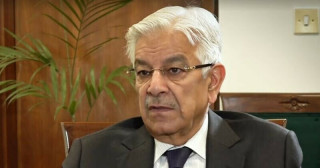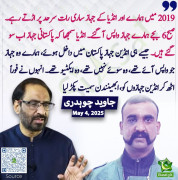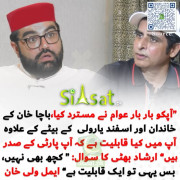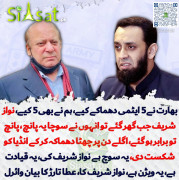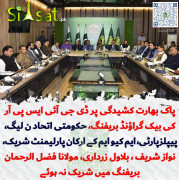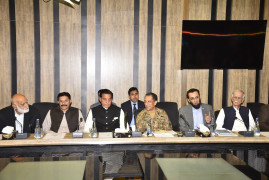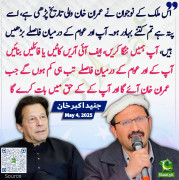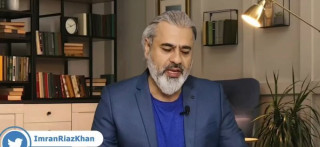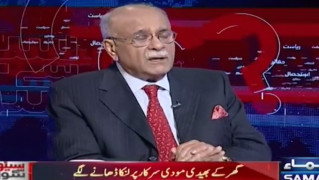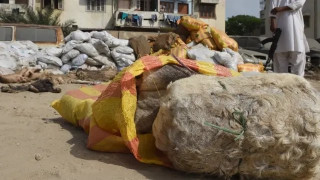Adeel
Founder
Pakistan Army might be selectively battling the "bad" Taliban in South Waziristan to please America, but it is simultaneously trying to destabilise the country by ousting President Asif Ali Zardari and installing a pliant government which would obey it. There is little doubt that the orchestrated outcry in Pakistan over the "conditions" in the Kerry-Lugar legislation that enables the Obama Administration to give Pakistan $7.5 billion in development aid over five years was a stage setter for the "dislodge Zardari" campaign. The President has suffered several debacles in recent months and is now fighting a battle for survival in office.
Continued political instability and a major upheaval in Pakistan has implications for India because a new dispensation may follow the Army's old agenda of intensifying its "proxy war" and step up terrorist activities in Jammu and Kashmir and other parts of India. The military has debunked the peace process initiated during the tenure of former President Musharraf, which makes India wait and watch before committing to initiate talks with Islamabad on revolving bilateral issues, which may yield little in concrete terms. The Army, which depends for its survival on continued tension along the international border and hostility towards India, has always opposed peace with India and has put hurdles in the way of the two countries normalising their relations.
The ongoing political intrigue is consuming all the energies of a fledgling government, rendering it more inefficient and unable to deliver, both in matters of basic governance and on the major issues confronting the country. Inflation is sky-rocketing, internal security has deteriorated and the people are bent under daily anxiety of not knowing if they or their children will return home alive as every day militancy and terrorism strike across the country. The politicians too now seem to realise the feelings of the people of India against continued Pakistan-sponsored terror attacks over the past two decades and its consequences for peace and tranquility in Jammu and Kashmir.
The last straw for the Pakistan Army was the Kerry-Lugar Bill which ties US aid to civilian supremacy over the military in Pakistan and represents a bid by Washington to work with the Zardari Government to rein in the Pakistan military. The Generals also fear that Zardari, in his capacity as the Supreme Commander of the Armed Forces, might appoint generals of his choice when the present top hierarchy retires in next October. As STRATFOR also points out, the Pakistan military sees the alignment of the Obama Administration with Zardari as further undermining its position. This too at a time when power within the country has weakened because of the rise of civilian forces and Taliban insurgency. However, the domestic situation and pressure from Washington has placed considerable limits on the ability of the military to dislodge the civilian government.
The military is now using its influence to help align forces against President Zardari, to force him out of office with a veneer of legality. The goal is, thus, not to unseat the entire government, but to get rid of Zardari in such a way that it looks like the byproduct of a constitutional process, rather than that of a military coup a return to the times when the military dismissed four different governments between 1985 and 1999. The US Administration, however, feels that unless the Army is brought under civilian control, Washington cannot deal with the region's Taliban and Al Qaeda problems. This is because the Pakistani security establishment draws a distinction between the "good" Taliban, that fight the US and NATO forces inside Afghanistan, and "bad" Taliban that wage war in Pakistan against the security forces and commit terrorist acts.
Pakistan Army, as an institution, has remained deeply opposed to Zardari, though it has continued to work with him because he happens to be an elected President. This is also due to the fact that the Army and its Inter-Services Intelligence (ISI) Directorate--whose dubious role also has been fully exposed by the US--feel no better alternative to Zardari exists capable of leading Pakistan. Though Zardari is not listening to the Army's commands, he has weakened himself considerably through faulty moves which spring mainly from his inexperience in politics and actual governance, though he enjoyed great influence during the premiership of his slain wife Benazir Bhutto and allegedly indulged in wheeling and dealing. He reneged on his public pledge to restore Iftikhar Chaudury as Chief Justice of Pakistan, but was forced to do so after the opposition Pakistan Muslim League (N) and other parties launched a countrywide agitation and the Army Chief Kayani advised him to back off from the confrontation and restore the judge of the Supreme and High Court dismissed by Gen Musharraf.
Zardari confronted PML (N) leader Nawaz Sharif by destabilising the Punjab government headed by his brother Shahbaz Sharif, who later sought help of the resurgent judiciary and romped back to provincial power, splattering mud on Zardari's face. Zardari backed the Kerry-Lugar Bill to ensure civilian supremacy over the Army which the latter intensely dislikes. The Army wants a president who will back its strategy and tactics to deal "appropriately" with India, Afghanistan and America. Zardari's "soft" approach to all three is not liked by the Army. His clumsy efforts to bring the ISI under civilian control and urge the Army to back the US agenda in Afghanistan -- the U-turn was taken actually by Gen Musharraf after 9/11 -- have aroused deep suspicion and hostility. The Army is now conducting the operation in South Waziristan only reluctantly: otherwise it will not receive continued American backing and military hardware for free, but is not touching the Taliban in Afghanistan, whom it considers a "strategic asset".
To oust Zardari, the Army is banking on Nawaz Sharif, who was a creation of Gen Zia-ul-Haq, or render him power-less. But it trusts Sharif upto a point because, during his premiership he sacked two Army Chiefs and is out to take revenge on Gen Musharraf, who exiled him. He is committed to the Charter of Democracy he had signed with Benazir Bhutto which envisages civilian control of the Army and the ISI. Therefore, the military would like to see Prime Minister Yusuf Raza Gilani -- whom it has cultivated sufficiently -- and a new pliant President to do its bidding. But Sharif wants to ally with the military to weaken Mr. Zardari to the point where he is amenable to undoing the Constitution 17th Amendment that bars him from becoming Prime Minister a third time, but retain him until his objective is achieved.
Mr. Zardari has been further weakened by coalition partner Muttahida Quami opposing legalising the National Reconciliation Ordinance, promulgated by former President Pervez Musharraf to erase corruption cases against Benazir Bhutto and Zardari and enable her return to Pakistan and fight elections to the National Assembly. The Supreme Court asked the Parliament to decide by November end the fate of NRO and other ordinances. But with MQM's opposition, the Ordinance cannot be passed in the National Assembly and is bound to lapse. The immediate fallout would be that the corruption cases against Zardari and others would stand revived. Though Zardari is protected by Presidential immunity, it would open the floodgates of challenges to his election on the ground of ineligibility. But if some of his ministers and supporters are prosecuted, he would be further weakened. Considering the mood of a resurgent judiciary, it will be difficult for the government not to proceed with the cases against these pardoned under the NRO.
It has been suggested to him that he seek the cooperation of Nawaz Sharif and, with the support of his PML (N), get the Charter of Democracy enshrined in the Constitution. He can also get the Constitution amendment deleted to enable Sharif to get a third-time prime ministership and thereby ensure continuance of the present PPP-led government till its full term. The courts would be helpless if thing are done constitutionally and derailment of the democratic system would thus be prevented. Mr. Zardari will also agree to give up some of his extra-ordinary constitutional powers of dismissal of Prime Minister or Chief Minister and dissolution of Parliament and the provincial assemblies etc, which would vest with an elected Prime Minister and his cabinet, on whose advice the President would take action.
Of course, the future will be, as was the past, dictated by the Army, regardless of the sermons on democracy the Obama Administration might deliver. Washington needs the Pakistan Army, more than its civilian leaders to achieve its strategic objectives in the region. It is for the civilian leaders to patch up their differences, forge a united democratic front to strength democracy and deny opportunity to the Army to play one against the another and overrule and dominate both.
Continued political instability and a major upheaval in Pakistan has implications for India because a new dispensation may follow the Army's old agenda of intensifying its "proxy war" and step up terrorist activities in Jammu and Kashmir and other parts of India. The military has debunked the peace process initiated during the tenure of former President Musharraf, which makes India wait and watch before committing to initiate talks with Islamabad on revolving bilateral issues, which may yield little in concrete terms. The Army, which depends for its survival on continued tension along the international border and hostility towards India, has always opposed peace with India and has put hurdles in the way of the two countries normalising their relations.
The ongoing political intrigue is consuming all the energies of a fledgling government, rendering it more inefficient and unable to deliver, both in matters of basic governance and on the major issues confronting the country. Inflation is sky-rocketing, internal security has deteriorated and the people are bent under daily anxiety of not knowing if they or their children will return home alive as every day militancy and terrorism strike across the country. The politicians too now seem to realise the feelings of the people of India against continued Pakistan-sponsored terror attacks over the past two decades and its consequences for peace and tranquility in Jammu and Kashmir.
The last straw for the Pakistan Army was the Kerry-Lugar Bill which ties US aid to civilian supremacy over the military in Pakistan and represents a bid by Washington to work with the Zardari Government to rein in the Pakistan military. The Generals also fear that Zardari, in his capacity as the Supreme Commander of the Armed Forces, might appoint generals of his choice when the present top hierarchy retires in next October. As STRATFOR also points out, the Pakistan military sees the alignment of the Obama Administration with Zardari as further undermining its position. This too at a time when power within the country has weakened because of the rise of civilian forces and Taliban insurgency. However, the domestic situation and pressure from Washington has placed considerable limits on the ability of the military to dislodge the civilian government.
The military is now using its influence to help align forces against President Zardari, to force him out of office with a veneer of legality. The goal is, thus, not to unseat the entire government, but to get rid of Zardari in such a way that it looks like the byproduct of a constitutional process, rather than that of a military coup a return to the times when the military dismissed four different governments between 1985 and 1999. The US Administration, however, feels that unless the Army is brought under civilian control, Washington cannot deal with the region's Taliban and Al Qaeda problems. This is because the Pakistani security establishment draws a distinction between the "good" Taliban, that fight the US and NATO forces inside Afghanistan, and "bad" Taliban that wage war in Pakistan against the security forces and commit terrorist acts.
Pakistan Army, as an institution, has remained deeply opposed to Zardari, though it has continued to work with him because he happens to be an elected President. This is also due to the fact that the Army and its Inter-Services Intelligence (ISI) Directorate--whose dubious role also has been fully exposed by the US--feel no better alternative to Zardari exists capable of leading Pakistan. Though Zardari is not listening to the Army's commands, he has weakened himself considerably through faulty moves which spring mainly from his inexperience in politics and actual governance, though he enjoyed great influence during the premiership of his slain wife Benazir Bhutto and allegedly indulged in wheeling and dealing. He reneged on his public pledge to restore Iftikhar Chaudury as Chief Justice of Pakistan, but was forced to do so after the opposition Pakistan Muslim League (N) and other parties launched a countrywide agitation and the Army Chief Kayani advised him to back off from the confrontation and restore the judge of the Supreme and High Court dismissed by Gen Musharraf.
Zardari confronted PML (N) leader Nawaz Sharif by destabilising the Punjab government headed by his brother Shahbaz Sharif, who later sought help of the resurgent judiciary and romped back to provincial power, splattering mud on Zardari's face. Zardari backed the Kerry-Lugar Bill to ensure civilian supremacy over the Army which the latter intensely dislikes. The Army wants a president who will back its strategy and tactics to deal "appropriately" with India, Afghanistan and America. Zardari's "soft" approach to all three is not liked by the Army. His clumsy efforts to bring the ISI under civilian control and urge the Army to back the US agenda in Afghanistan -- the U-turn was taken actually by Gen Musharraf after 9/11 -- have aroused deep suspicion and hostility. The Army is now conducting the operation in South Waziristan only reluctantly: otherwise it will not receive continued American backing and military hardware for free, but is not touching the Taliban in Afghanistan, whom it considers a "strategic asset".
To oust Zardari, the Army is banking on Nawaz Sharif, who was a creation of Gen Zia-ul-Haq, or render him power-less. But it trusts Sharif upto a point because, during his premiership he sacked two Army Chiefs and is out to take revenge on Gen Musharraf, who exiled him. He is committed to the Charter of Democracy he had signed with Benazir Bhutto which envisages civilian control of the Army and the ISI. Therefore, the military would like to see Prime Minister Yusuf Raza Gilani -- whom it has cultivated sufficiently -- and a new pliant President to do its bidding. But Sharif wants to ally with the military to weaken Mr. Zardari to the point where he is amenable to undoing the Constitution 17th Amendment that bars him from becoming Prime Minister a third time, but retain him until his objective is achieved.
Mr. Zardari has been further weakened by coalition partner Muttahida Quami opposing legalising the National Reconciliation Ordinance, promulgated by former President Pervez Musharraf to erase corruption cases against Benazir Bhutto and Zardari and enable her return to Pakistan and fight elections to the National Assembly. The Supreme Court asked the Parliament to decide by November end the fate of NRO and other ordinances. But with MQM's opposition, the Ordinance cannot be passed in the National Assembly and is bound to lapse. The immediate fallout would be that the corruption cases against Zardari and others would stand revived. Though Zardari is protected by Presidential immunity, it would open the floodgates of challenges to his election on the ground of ineligibility. But if some of his ministers and supporters are prosecuted, he would be further weakened. Considering the mood of a resurgent judiciary, it will be difficult for the government not to proceed with the cases against these pardoned under the NRO.
It has been suggested to him that he seek the cooperation of Nawaz Sharif and, with the support of his PML (N), get the Charter of Democracy enshrined in the Constitution. He can also get the Constitution amendment deleted to enable Sharif to get a third-time prime ministership and thereby ensure continuance of the present PPP-led government till its full term. The courts would be helpless if thing are done constitutionally and derailment of the democratic system would thus be prevented. Mr. Zardari will also agree to give up some of his extra-ordinary constitutional powers of dismissal of Prime Minister or Chief Minister and dissolution of Parliament and the provincial assemblies etc, which would vest with an elected Prime Minister and his cabinet, on whose advice the President would take action.
Of course, the future will be, as was the past, dictated by the Army, regardless of the sermons on democracy the Obama Administration might deliver. Washington needs the Pakistan Army, more than its civilian leaders to achieve its strategic objectives in the region. It is for the civilian leaders to patch up their differences, forge a united democratic front to strength democracy and deny opportunity to the Army to play one against the another and overrule and dominate both.

